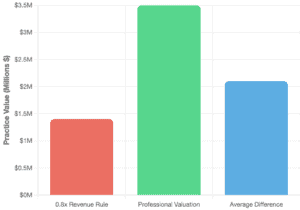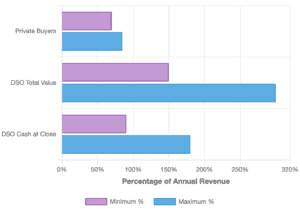
June 7, 2020
Discover Your Accurate Dental Practice Valuation to Make Smarter Transition Decisions

Why A Professional Dental Practice Valuation Matters
Understanding your accurate dental practice valuation is crucial for planning your next steps, whether you’re planning to sell, expand or optimize operations. A formal valuation from Professional Transition Strategies provides a detailed financial snapshot to guide strategic decisions and make informed choices about your practice’s future.
Your comprehensive practice prospectus will highlight your practice’s financial health, identify growth opportunities and lay the foundation for a successful transition – whether you’re considering a sale to an individual buyer, affiliating with a Dental Support Organization (DSO), expanding your footprint or bringing on a partner.
Whether you’re looking to sell all or a portion of your practice or just want to know what the health of your practice is, it’s smart to obtain a prospectus. You’ll better understand your options, so you can make an educated decision based on fact in addition to having a good understanding of where you are and gaining a clear line of sight as to how to reach your goals.
Fair market value, according to IRS Rev. Ruling 59-60, 1959-1 C.B., is defined as, “the price at which a property would change hands between a willing buyer and a willing seller when the buyer is not under any compulsion to buy and the seller is not under any compulsion to sell, with both parties having reasonable knowledge of the relevant facts.”

Source: Dental Economics – Analysis of 46 practice valuations
Key Takeaways:
- 62% higher value on average with professional appraisal vs. 0.8x revenue rule
- 27 out of 46 practices were undervalued by $1M+ using simple multiples
- Professional valuations consider profitability, growth potential and market conditions
Key Metrics for Dental Practice Valuation: SDE vs. EBITDA
One component included in evaluating a practice is the adjusted earnings before interest, tax, depreciation, and amortization (EBITDA). Put simply, EBITDA measures the practice’s operating performance and determines sustainable cash flow. Adjustments to doctor’s compensation, P&L, personal and one-time expenses and net income of the practice are added together to achieve adjusted EBITDA.
At PTS, we also take into consideration who the buyer will be. For example, the fair market value of a practice being sold to an individual will oftentimes be very different than the value of being sold to a DSO or private equity. This difference is often reflected in the market multiples applied to your practice’s earnings. The reason for the difference is that the value revolves around the limitations on what a bank will lend to an individual vs. the buying power for a group or fund. With our market knowledge and industry expertise, we are experts at delineating the two and presenting accurate values for each type of buyer.

Source: McLerran & Associates Industry Analysis (May 2024)
Key Takeaways:
- Private buyers: Pay 70-85% of annual revenue consistently
- DSO acquisitions: 6-9X EBITDA (150% – 300% of revenue)
- DSO cash at close: 60-80% with remainder held back
- Practice size matters: $1M+ revenue required for DSO interest
How Different Factors Impact Your Dental Practice Valuation
How does owning vs. leasing my office affect valuation?
Owning gives you the option to sell the property with your practice for a larger upfront payout or lease it to the buyer for long-term income. The right choice depends on your financial goals and willingness to manage the property post-sale.
Our real estate experts are here to advise you every step of the way.
Do insurance models impact practice value?
Yes. Fee-for-Service (FFS) practices typically earn the highest valuations due to predictable revenue. PPO practices remain attractive – especially when your reimbursement rates are optimized.
Medicaid participation can lower valuation due to lower rates and added complexity. But, at the end of the day, well-run practices still attract buyers.
How can I improve my insurance mix before a sale?
Consider working with seasoned dental practice brokers to understand how your current insurance mix influences your practice’s value by having a formal prospectus of your business performed.
Then, work with experts to explore ways to renegotiate your reimbursement rates, and determine if dropping low-performing plans is advantageous to increase your profitability
Does equipment affect valuation?
Advanced equipment like CBCT or CAD/CAM can boost value, but most buyers focus on cash flow. Outdated tech may reduce valuation if upgrades are needed.
Should I invest in new equipment before selling?
Not necessarily. Upgrades only add value if they improve buyer interest or operational efficiency. An experienced dental practice broker will be able to assess your current equipment and advise on if you should make upgrades.
How does debt affect my practice’s value?
High debt or unresolved legal issues can definitely hurt your valuation. Paying down debt, staying on top of taxes and eliminating liabilities can make your practice more attractive.
There are many factors used in calculating the value of your practice. At Professional Transition Strategies, we use the most hollistic approach of calculating your practice’s worth by looking at both attributes and challenges and how they have impacted the success of the practice.
Factors used in determining dental practice value
- The practice’s location, visibility and population of city or town
- Type of medicine or dentistry, revenue sources and active patient base
- Growth potential
- Patient attraction and retention rates
- Reason for sale of practice
- Projected patient and revenue retention after the sale
- Condition and age of medical and dental equipment based on wear and tear, as well as technical advancement
- Office decor and condition
- Long-term trends of the practice’s revenue and profit margin
The value determined by analyzing the information listed above, as well as financial information, will be the best indicator of what a practice can garner on the open market. It is important to note that in most cases, this valuation will not include the accounts receivable (A/R) of the practice, cash on hand and any other bank or cash accounts, as well as the practice owner’s belongings, marketable securities, real estate or vehicles, if any.
I’m ready to proceed with a practice valuation. What do I have to do?
The typical information collected to create a dental practice appraisal includes:
- Three years of profit-and-loss statements
- Three years of tax returns
- Current balance sheet
- Production broken down by provider
- Production broken down by procedure type
- Total active patients
- New patients per month for the past 12 months
- A/R aging report
- Copy of current lease (if applicable)
- Employee roster with hire dates and hourly wages and benefits
- Website
- Lists of insurance plans the practice accepts
Please note nearly all information can be run on your practice management software or accounting software, as well as your certified public accountant (CPA).
What other factors affect valuation across dental practices?
It is also smart to be aware of the type of dentistry performed based on the composition of the production. For instance, is the practice hygiene heavy, is it a bread-and-butter practice, is there a lot of specialty work performed in the practice, or is it primarily referred out?
One thing that is not included within a valuation is A/R. The A/R can be sold separately or not at all. The final sale price will therefore be the practice valuation plus any accounts receivable purchased at closing. The reason A/R is not incorporated into the value is that it changes by the day, hour or even minute. Therefore, the value of accounts receivables will be determined the day of closing.
Should you be seeking a prospectus for your dental practice because you plan on selling all or a portion of your practice, it is important to note that while the previous three year’s financials are included and trends are analyzed, the most recent year is what the valuation is primarily based on. This is one of the many reasons it is advised to consider a transition during a peak in your production rather than after you’ve slowed down and decreased the value of your practice.
How to Increase Your Practice Value ASAP
1. Streamline Operations
Reduce inefficiencies and ensure all systems are well-documented.
2. Boost Your Online Presence
- Encourage positive patient reviews to add credibility to your practice and attract new patients.
- Maintain an informative, high-converting website that encourages new patients to move to your practice.
3. Secure Your Patient Base
Show consistent patient retention and growth to make your practice more attractive to buyers.
So, who’s interested in a practice with strong average annual growth?
Just as there are different transition types, there are also different types of buyers, as mentioned before. To ensure you have all the information you need to decide the right strategy for you and your dental practice, it is advised to understand the difference in value from an individual receiving a bank loan compared to a larger DSO with private equity backing.
When conducting practice valuations, we employ multiple methodologies to ensure accuracy. While some buyers focus primarily on a revenue multiple, others may emphasize the excess earnings method or discounted cash flow analysis. As specialists in the healthcare industry, our advisory team combines these approaches to generate the most accurate and defensible valuation. This comprehensive appraisal method ensures you receive maximum value whether selling to an individual doctor or a dental service organization.
Unfortunately, unlike basic real estate, there is not a multiple listing service (MLS) or a centralized database of dental practices previously sold. This is one of the several reasons you should have professional practice appraisals completed for your practice. As noted, business magnate and philanthropist Warren Buffett says, “Managers and investors alike must understand that accounting numbers are the beginning, not the end, of business valuation.”
Know Where you Stand. Start With a Professional Valuation Today!
A professional dental practice valuation from the team at Professional Transition Strategies gives you the clarity and data you need to make informed decisions about your future. Whether you’re exploring a sale, partnership, or just want to better understand your financial position, our valuation process provides the insights to move forward with confidence.
Begin Your Practice Valuation Today.